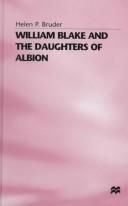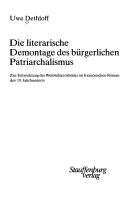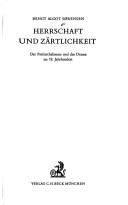| Listing 1 - 10 of 44 | << page >> |
Sort by
|

ISBN: 0312174810 Year: 1997 Publisher: New York (N.Y.) : St. Martin's press,
Abstract | Keywords | Export | Availability | Bookmark
 Loading...
Loading...Choose an application
- Reference Manager
- EndNote
- RefWorks (Direct export to RefWorks)
Feminism and literature --- Patriarchy in literature. --- Sex role in literature. --- Women and literature --- History --- History
Book
ISBN: 9783770545865 Year: 2008 Publisher: München : Wilhelm Fink,
Abstract | Keywords | Export | Availability | Bookmark
 Loading...
Loading...Choose an application
- Reference Manager
- EndNote
- RefWorks (Direct export to RefWorks)
Enlightenment. --- European literature --- Patriarchy in literature. --- Sentimentalism in literature. --- History and criticism.
Book
ISBN: 3846745863 Year: 2008 Publisher: Paderborn : Wilhelm Fink Verlag,
Abstract | Keywords | Export | Availability | Bookmark
 Loading...
Loading...Choose an application
- Reference Manager
- EndNote
- RefWorks (Direct export to RefWorks)
Mit der Hinrichtung von Ludwig XVI. hat die Französische Revolution, behauptet Balzac, zugleich alle Familienväter enthauptet. Bezeichnenderweise sind es aber gerade die Väter, die im Jahrhundert der Aufklärung zum Lieblingsthema eines bürgerlichen Literaturbetriebs werden. Wie konnte der bürgerliche Familienvater den Vatermord, den die Republik am absolutistischen Königtum beging, so unbeschadet überstehen? Ausgangspunkt der Studie ist die Frage, wie die väterliche Autorität innerhalb des autoritätskritischen Impetus der Aufklärung legitimierbar ist – ein Zeitalter, das sich Mündigkeit und Emanzipation und damit gerade die Befreiung von den väterlichen Vormündern auf die Fahnen geschrieben hatte. Insbesondere in der Empfindsamkeit rückt die Figur des Vaters ins Zentrum von Romanen und Theaterstücken, welche die patria potestas mit eben jenen ästhetischen Mitteln befestigen, mit denen sie diese gleichzeitig unterminieren.
European literature --- Sentimentalism in literature. --- Patriarchy in literature. --- Enlightenment. --- History and criticism.
Book
ISBN: 1472589173 9781472589170 1472589165 1472589157 1472589149 1474237983 Year: 2015 Publisher: London ; New York, NY : Bloomsbury Academic, an imprint of Bloomsbury Publishing, Plc.,
Abstract | Keywords | Export | Availability | Bookmark
 Loading...
Loading...Choose an application
- Reference Manager
- EndNote
- RefWorks (Direct export to RefWorks)
"Patriarchalism is omnipresent in Western culture and it pervades the texts that have shaped this culture. From the creation story in the Bible to the ancient authors, from the Church fathers to the treatises of Enlightenment philosophers, right up to modern fiction, male authority over women, children and other dependents has shaped the nature of human relationships and the discourses about these relationships. This collection of short essays offers fresh and novel readings of key texts in the history of patriarchalism as a concept of power. The texts selected are from political, religious and literary works and together the readings add new insights to a tradition that has never gone uncontested, yet is unlikely to disappear soon."--Bloomsbury Publishing.
Patriarchy --- Patriarchy in literature --- Social & Cultural Anthropology --- Anthropology --- Social Sciences --- Religious aspects --- Androcracy --- Patriarchal families --- Fathers --- Families --- Male domination (Social structure) --- Patrilineal kinship --- Patriarchy. --- Patriarchy in literature. --- Religious aspects. --- Social and political philosophy --- Political ideologies --- Politics and government
Book
ISBN: 0815650892 9780815650898 9780815632375 0815632371 Year: 2009 Publisher: Syracuse, N.Y. Syracuse University Press
Abstract | Keywords | Export | Availability | Bookmark
 Loading...
Loading...Choose an application
- Reference Manager
- EndNote
- RefWorks (Direct export to RefWorks)
Book
ISBN: 0813934001 9780813934006 9780813933993 0813933994 Year: 2013 Publisher: Charlottesville
Abstract | Keywords | Export | Availability | Bookmark
 Loading...
Loading...Choose an application
- Reference Manager
- EndNote
- RefWorks (Direct export to RefWorks)
In this book, a contribution to the psychoanalytic approach to literature, the author focuses on the fiction of four major American writers - William Faulkner, Richard Wright, Flannery O'Connor, and Toni Morrison - to examine the father's function as a "border figure." Although the father has most commonly been interpreted as the figure who introduces opposition and exclusion to the child, the author finds in these literary depictions fathers who instead support the construction of a social identity by mediating between cultural oppositions.

ISBN: 3923721595 Year: 1988 Publisher: Tübingen Stauffenburg
Abstract | Keywords | Export | Availability | Bookmark
 Loading...
Loading...Choose an application
- Reference Manager
- EndNote
- RefWorks (Direct export to RefWorks)
Book
ISBN: 9781592218707 Year: 2012 Publisher: Trenton : Africa World Press,
Abstract | Keywords | Export | Availability | Bookmark
 Loading...
Loading...Choose an application
- Reference Manager
- EndNote
- RefWorks (Direct export to RefWorks)
Women character portraiture in Achebe's novels has been seen from the widely explicit inferiority that marks her being. She is schooled from infancy to be docile and be satisfied with being voice-less even in matters that affect her or her children directly. The overall picture of women is one of weakness and self-effacement. This image stuck especially from the background of Achebe's objective to present real heroes in the culture that is not what Josef Konrad depicted in Heart of Darkness. The story of Things Fall Apart is of Okonkwo and a society of men where women were relegated to the background of domesticity and motherhood and where if they offered any opposition however feeble, they were beaten to submission and silence. True but that did not reflect the whole story. There are indeed some historical and cultural imperatives in Achebe's representation of women in his fiction. These are varied according to the historical setting of his novels. The rural setting of Things Fall Apart in the pre-colonial period showed women with little or no identity except as wives and mothers. No tales of renown or accomplishments are told of them even as mothers and mothers of sons. In this text, we posit that women faced with overwhelming odds of subsumation, do manage to navigate their way through, enough to affect men's power and yet, no songs are made on them, their stories are not told. This text is our song for the un-sung, our recognition of the roles of women in the subsuming patriarchal society. This text aims to project the activities of women characters behind the enclave of subsuming patriarchy. It is an interrogation of the image and status of women in Achebe's fiction. The female characters are the foundation on which the home rests. Without them, there will be neither home, nor children nor nurture. Importantly, the power of women is the power of the survivor; they are the real heroines who withstand time after the ravages of men and war. In this regard, they form the spirit essence of life anchor which holds all humanity to obeisance and ethical behavior. Thus Ani/Ala is the earth goddess who oversees the activities of men. The Oracle of the Hills and Caves has a priestess on which her supreme authority is bestowed to oversee the general day-to- day living of mortals. The failure and tragedy of Okonkwo rests on his non-recognition of the female principle which is the balancing principle of life. In this text, we note the developmental portraiture of women by Achebe in his subsequent novels. Thus the woman continues to develop to Beatrice in Anthills of the Savannah. In this novel the old parameters of woman-being gave way to fresh paradigms of personhood and identity. This text is informed by two considerations: first to record our tribute to the Eagle on the Iroko our highly esteemed and beloved Chinua Achebe as a post- fiftieth anniversary tribute of the publication of Things Fall Apart and the making of modern African Literature. Secondly to re-visit the portraiture of women characters in order to show the true image of women, regardless of the patriarchal tent. This text shows in bold profile, the strengths and resilience of women which are not celebrated, not brought to the fore but are present and pervasive nonetheless.
Women in literature --- Sex role in literature --- Patriarchy in literature --- Achebe, Chinua --- Achebe, Chinua --- Characters --- Women. --- Political and social views.

ISBN: 3406096689 Year: 1984 Publisher: München Beck
Abstract | Keywords | Export | Availability | Bookmark
 Loading...
Loading...Choose an application
- Reference Manager
- EndNote
- RefWorks (Direct export to RefWorks)
German literature --- Drama --- anno 1700-1799 --- 830-2 "17" --- German drama --- -Patriarchy in literature --- Duitse literatuur: toneel; drama--18e eeuw. Periode 1700-1799 --- History and criticism --- Patriarchy in literature. --- History and criticism. --- 830-2 "17" Duitse literatuur: toneel; drama--18e eeuw. Periode 1700-1799 --- Patriarchy in literature
Book
ISBN: 1611476380 9781611476385 9781306573467 1306573467 9781611476378 1611476372 1683930703 9781683930709 Year: 2013 Publisher: Madison Lanham, Maryland
Abstract | Keywords | Export | Availability | Bookmark
 Loading...
Loading...Choose an application
- Reference Manager
- EndNote
- RefWorks (Direct export to RefWorks)
Outlaw Fathers provides an innovative reading of fatherhood and father-son relationships in a number of Victorian and modern literary texts. In addition to using an inventive psychoanalytic paradigm for redefining, or queering, the concept of patriarchy in literary studies and theory, it joins a larger contemporary conversation about changing masculinities and families.
| Listing 1 - 10 of 44 | << page >> |
Sort by
|

 Search
Search Feedback
Feedback About UniCat
About UniCat  Help
Help News
News